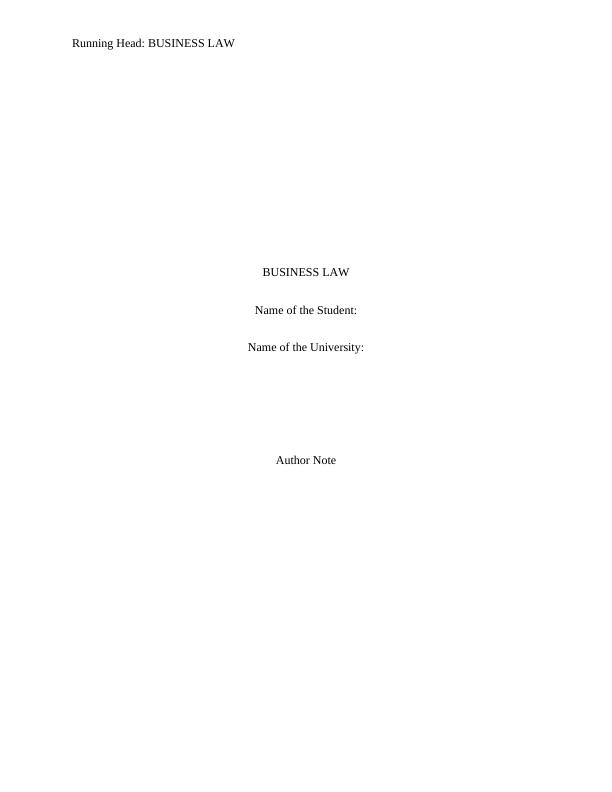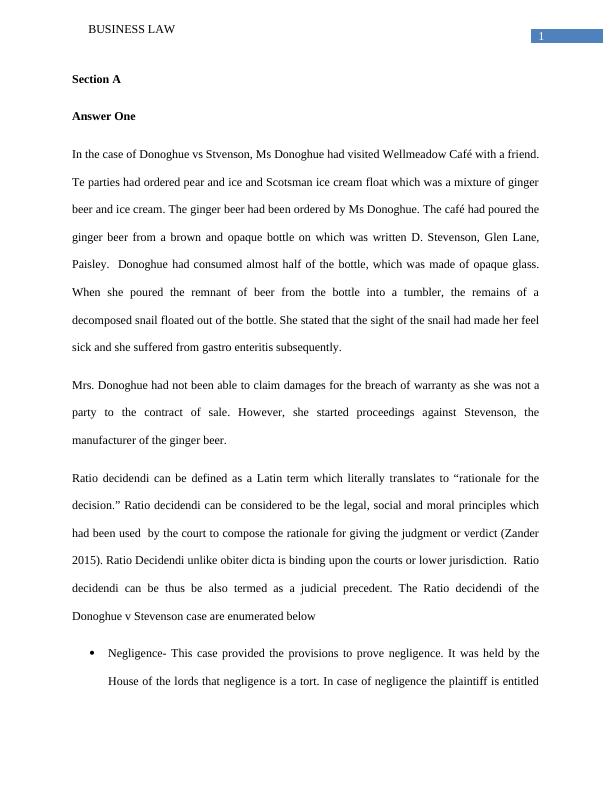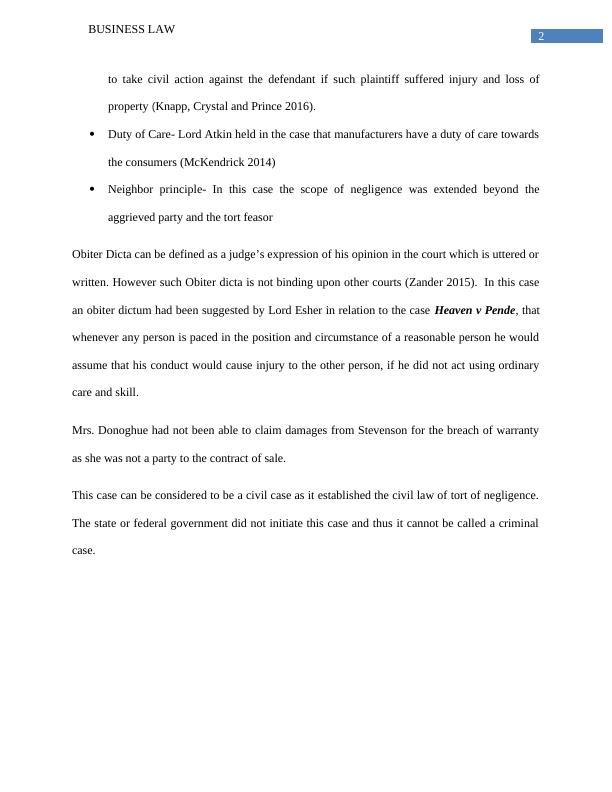Business Law: Donoghue vs Stevenson & Contract Essentials
Added on 2023-06-14
10 Pages2226 Words54 Views
Running Head: BUSINESS LAW
BUSINESS LAW
Name of the Student:
Name of the University:
Author Note
BUSINESS LAW
Name of the Student:
Name of the University:
Author Note

1
BUSINESS LAW
Section A
Answer One
In the case of Donoghue vs Stvenson, Ms Donoghue had visited Wellmeadow Café with a friend.
Te parties had ordered pear and ice and Scotsman ice cream float which was a mixture of ginger
beer and ice cream. The ginger beer had been ordered by Ms Donoghue. The café had poured the
ginger beer from a brown and opaque bottle on which was written D. Stevenson, Glen Lane,
Paisley. Donoghue had consumed almost half of the bottle, which was made of opaque glass.
When she poured the remnant of beer from the bottle into a tumbler, the remains of a
decomposed snail floated out of the bottle. She stated that the sight of the snail had made her feel
sick and she suffered from gastro enteritis subsequently.
Mrs. Donoghue had not been able to claim damages for the breach of warranty as she was not a
party to the contract of sale. However, she started proceedings against Stevenson, the
manufacturer of the ginger beer.
Ratio decidendi can be defined as a Latin term which literally translates to “rationale for the
decision.” Ratio decidendi can be considered to be the legal, social and moral principles which
had been used by the court to compose the rationale for giving the judgment or verdict (Zander
2015). Ratio Decidendi unlike obiter dicta is binding upon the courts or lower jurisdiction. Ratio
decidendi can be thus be also termed as a judicial precedent. The Ratio decidendi of the
Donoghue v Stevenson case are enumerated below
Negligence- This case provided the provisions to prove negligence. It was held by the
House of the lords that negligence is a tort. In case of negligence the plaintiff is entitled
BUSINESS LAW
Section A
Answer One
In the case of Donoghue vs Stvenson, Ms Donoghue had visited Wellmeadow Café with a friend.
Te parties had ordered pear and ice and Scotsman ice cream float which was a mixture of ginger
beer and ice cream. The ginger beer had been ordered by Ms Donoghue. The café had poured the
ginger beer from a brown and opaque bottle on which was written D. Stevenson, Glen Lane,
Paisley. Donoghue had consumed almost half of the bottle, which was made of opaque glass.
When she poured the remnant of beer from the bottle into a tumbler, the remains of a
decomposed snail floated out of the bottle. She stated that the sight of the snail had made her feel
sick and she suffered from gastro enteritis subsequently.
Mrs. Donoghue had not been able to claim damages for the breach of warranty as she was not a
party to the contract of sale. However, she started proceedings against Stevenson, the
manufacturer of the ginger beer.
Ratio decidendi can be defined as a Latin term which literally translates to “rationale for the
decision.” Ratio decidendi can be considered to be the legal, social and moral principles which
had been used by the court to compose the rationale for giving the judgment or verdict (Zander
2015). Ratio Decidendi unlike obiter dicta is binding upon the courts or lower jurisdiction. Ratio
decidendi can be thus be also termed as a judicial precedent. The Ratio decidendi of the
Donoghue v Stevenson case are enumerated below
Negligence- This case provided the provisions to prove negligence. It was held by the
House of the lords that negligence is a tort. In case of negligence the plaintiff is entitled

2
BUSINESS LAW
to take civil action against the defendant if such plaintiff suffered injury and loss of
property (Knapp, Crystal and Prince 2016).
Duty of Care- Lord Atkin held in the case that manufacturers have a duty of care towards
the consumers (McKendrick 2014)
Neighbor principle- In this case the scope of negligence was extended beyond the
aggrieved party and the tort feasor
Obiter Dicta can be defined as a judge’s expression of his opinion in the court which is uttered or
written. However such Obiter dicta is not binding upon other courts (Zander 2015). In this case
an obiter dictum had been suggested by Lord Esher in relation to the case Heaven v Pende, that
whenever any person is paced in the position and circumstance of a reasonable person he would
assume that his conduct would cause injury to the other person, if he did not act using ordinary
care and skill.
Mrs. Donoghue had not been able to claim damages from Stevenson for the breach of warranty
as she was not a party to the contract of sale.
This case can be considered to be a civil case as it established the civil law of tort of negligence.
The state or federal government did not initiate this case and thus it cannot be called a criminal
case.
BUSINESS LAW
to take civil action against the defendant if such plaintiff suffered injury and loss of
property (Knapp, Crystal and Prince 2016).
Duty of Care- Lord Atkin held in the case that manufacturers have a duty of care towards
the consumers (McKendrick 2014)
Neighbor principle- In this case the scope of negligence was extended beyond the
aggrieved party and the tort feasor
Obiter Dicta can be defined as a judge’s expression of his opinion in the court which is uttered or
written. However such Obiter dicta is not binding upon other courts (Zander 2015). In this case
an obiter dictum had been suggested by Lord Esher in relation to the case Heaven v Pende, that
whenever any person is paced in the position and circumstance of a reasonable person he would
assume that his conduct would cause injury to the other person, if he did not act using ordinary
care and skill.
Mrs. Donoghue had not been able to claim damages from Stevenson for the breach of warranty
as she was not a party to the contract of sale.
This case can be considered to be a civil case as it established the civil law of tort of negligence.
The state or federal government did not initiate this case and thus it cannot be called a criminal
case.

End of preview
Want to access all the pages? Upload your documents or become a member.
Related Documents
Donoghue v Stevenson [1932] UKHL 100lg...
|7
|1899
|55
Business Law: Donoghue v Stevensonlg...
|8
|1890
|201
Tort of Negligence in English Law (Tort of Negligence)lg...
|14
|5120
|216
BUS503 Principles of Commercial Lawlg...
|10
|2357
|140
Tort of Negligence: Duty of Care and Breachlg...
|10
|2514
|95
Carlill v Carbolic Smoke Ball Co Ltdlg...
|7
|1689
|23
